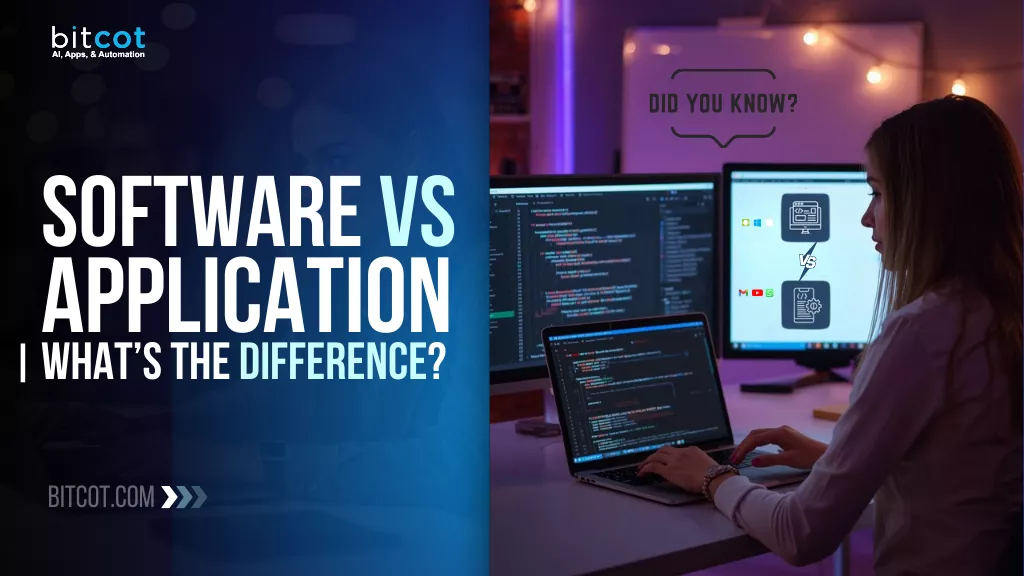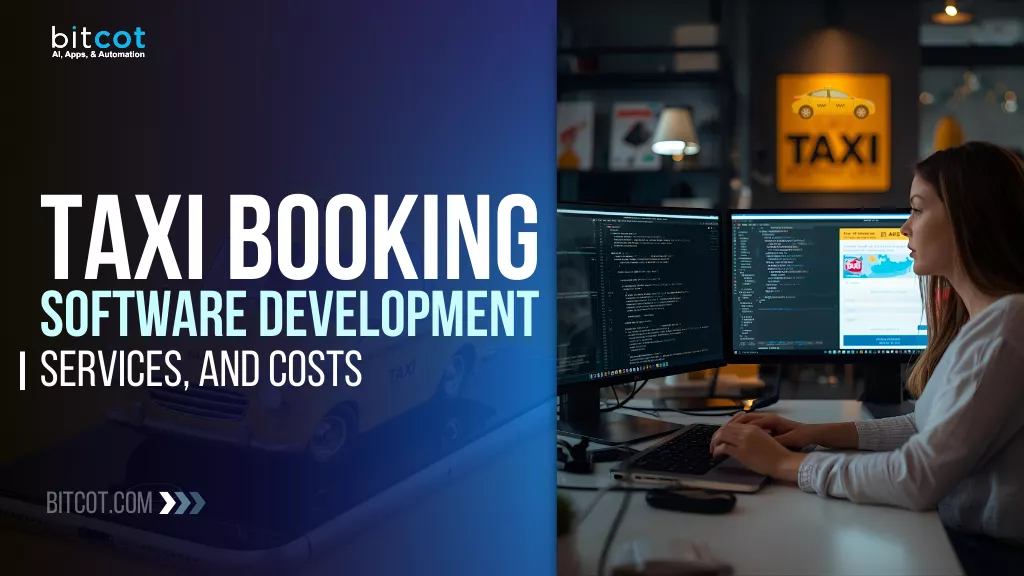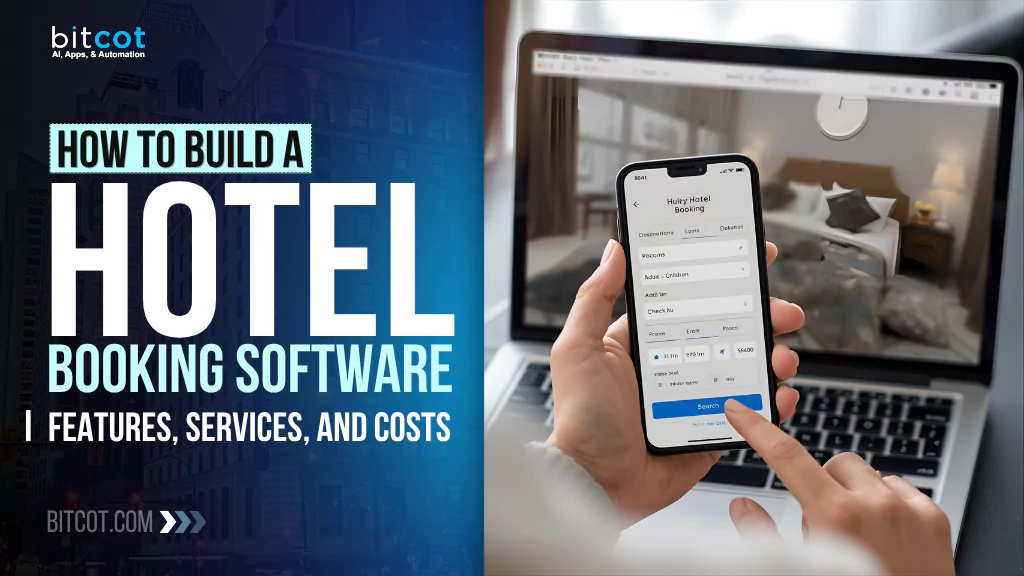
Building a hotel booking system sounds like a huge task, right?
Whether you’re running a hotel, looking to create an online booking platform, or simply curious about how it all works behind the scenes, you might be wondering where to even begin.
The truth is, creating a robust and user-friendly online booking system for a hotel isn’t as simple as putting together a website with a “book now” button. It’s an intricate process that requires thoughtful planning, smart features, and a clear understanding of the costs involved.
Think of it this way: when a guest walks into a hotel and checks in, they’re experiencing the end result of a carefully designed system: smooth, efficient, and streamlined. Now, imagine building that same smooth experience for users online, where things like payment, booking preferences, room availability, and guest details need to seamlessly come together.
In this guide, we’re going to break down how to create online hotel booking software. We’ll dive into the key features you need to consider, the different services that power the system, and the factors that influence the cost of hotel reservation system development.
By the end, you’ll have a clear picture of how to approach building a booking system that not only meets your needs but also leaves your guests with a positive, hassle-free experience.
What is a Hotel Booking System?
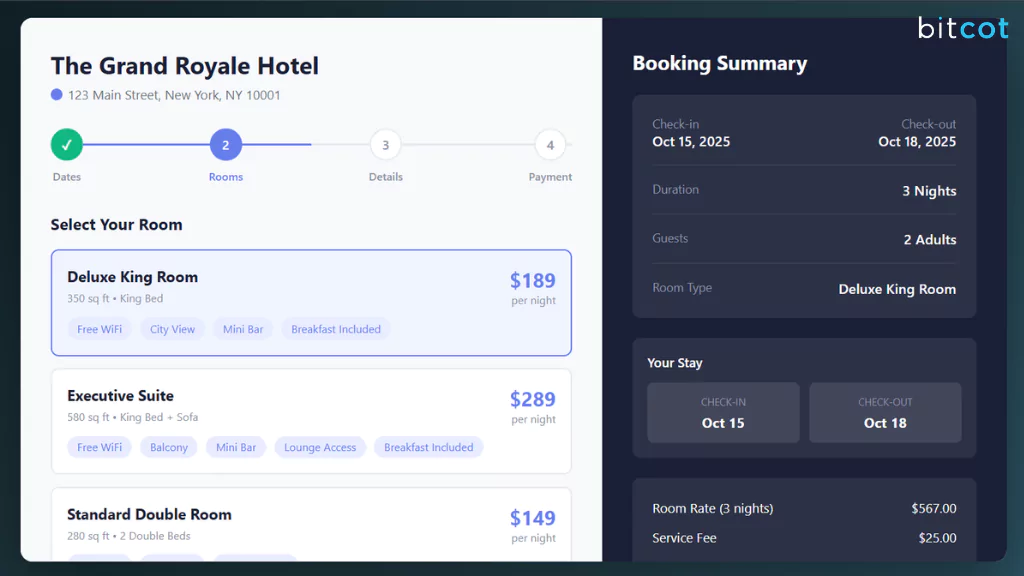
A hotel booking system is a sophisticated software solution that manages the entire reservation process for a hotel, from when a guest searches for available rooms to when they check out after their stay.
It’s the digital infrastructure that makes the hotel’s booking operations run smoothly, connecting the guest experience with the hotel’s internal systems in a seamless and efficient way.
When a guest wants to book a room, they typically visit a hotel’s website, an app, or an online travel agent platform. The hotel booking reservation software works behind the scenes to display available rooms, adjust prices based on demand, and securely collect guest information. It updates in real-time, ensuring that the hotel’s room availability is accurate and up-to-date.
Once a guest makes a reservation, the system processes the payment, confirms the booking, and sends an instant confirmation to the guest.
On the back end, the system automatically updates the room availability and notifies hotel staff of the new reservation. This automated hotel reservation system reduces the risk of errors like overbooking and double-booking, which can create frustrating experiences for both guests and hotel staff.
In addition to handling reservations, a hotel booking system also plays a crucial role in managing guest information. It stores details like guest contact information, special requests, and even preferences from past stays. This data helps hotels provide personalized services, such as room upgrades or tailored offers, and build guest loyalty over time.
For hotel owners and managers, the booking system is a centralized hub that makes it easy to manage multiple aspects of hotel operations, including pricing, guest communications, and even promotional campaigns.
A key component of any successful online presence is integrating hotel booking website software to manage inventory and process direct reservations securely. Many systems offer integration with other software, such as Property Management Systems (PMS) and Channel Managers, allowing hotels to sync reservations across multiple platforms and avoid confusion.
At its core, the hotel booking system is more than just a reservation tool; it’s a comprehensive solution that integrates everything from room management to guest experience.
By automating key processes, it saves time, reduces human error, and ensures a smoother experience for both the hotel and its guests. Whether it’s a small boutique hotel or a large chain, this system is essential for creating an organized, efficient, and user-friendly booking process.
Key Features to Include in Your Hotel Booking Software
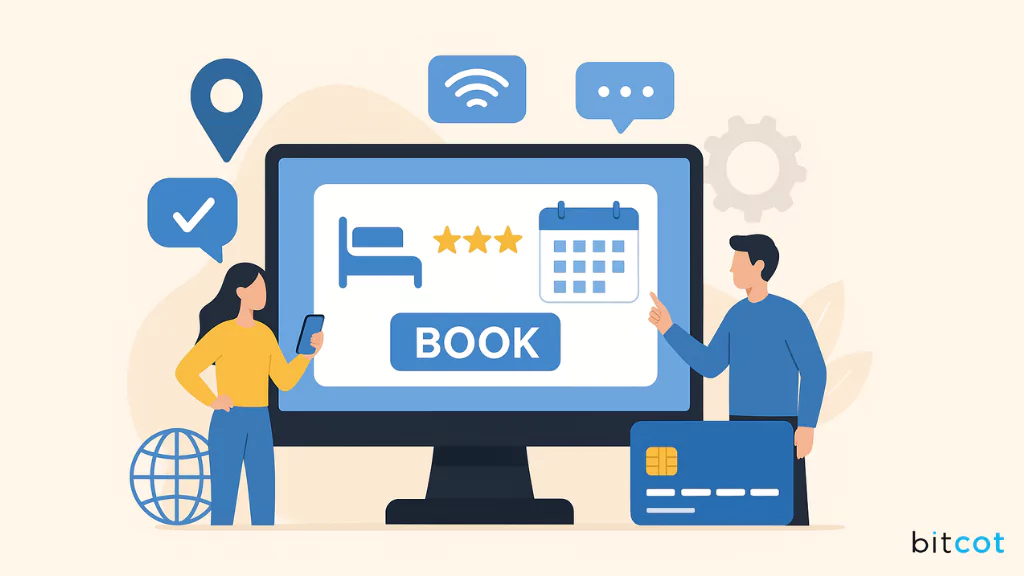
Building an effective hotel booking system requires more than just a way for guests to book a room.
To ensure a seamless experience for both guests and hotel staff, there are several key features that are essential for optimizing operations, improving guest satisfaction, and boosting revenue.
Let’s take a look at the must-have features that should be included in any modern hotel booking management software.
1. Real-Time Room Availability and Reservations
One of the most crucial features of a hotel booking system is real-time room availability. This ensures that guests can only book rooms that are actually available for the selected dates. The system automatically updates room status (e.g., reserved, available, under maintenance) in real time, reducing the risk of overbookings and double bookings.
- Why It’s Important: Real-time availability provides accurate information to guests and eliminates confusion. It also helps hotel staff manage bookings efficiently and avoid issues like booking conflicts.
2. Dynamic Pricing and Rate Management
Dynamic pricing allows your hotel to adjust room rates based on demand, seasonality, or local events. A good booking system should support flexible rate management, enabling you to change prices on the fly based on market conditions.
- Why It’s Important: By dynamically adjusting pricing, you can maximize revenue, filling rooms during low-demand periods and increasing rates when demand is high (for example, during holidays or local events). This helps you stay competitive and ensure you’re getting the best possible return for every room.
3. Guest Management and CRM Integration
A robust guest management system (often integrated with a Customer Relationship Management or CRM tool) is vital. It tracks all guest details, including contact information, stay preferences (e.g., room type, check-in time), and special requests. This data allows you to offer a personalized experience for each guest, making them feel valued and enhancing their overall stay.
- Why It’s Important: A personalized guest experience leads to higher satisfaction, loyalty, and repeat business. You can also use this information for targeted marketing campaigns or promotions tailored to your guests’ preferences.
4. Payment Processing and Security
The booking system should securely handle payment processing, including deposits, full payments, or payment upon check-in. It should integrate with various payment gateways to accept credit cards, debit cards, and online payment methods (e.g., PayPal or Stripe). Additionally, your system should be compliant with PCI-DSS (Payment Card Industry Data Security Standard) to ensure safe transactions.
- Why It’s Important: Secure payment processing reduces the risk of fraud and ensures that transactions are smooth and hassle-free for both guests and hotel management. Providing multiple payment options increases convenience for guests, improving their overall booking experience.
5. Booking Confirmation and Notifications
Once a guest has made a reservation, the booking system should send an immediate confirmation email or SMS with the details of the reservation, including the room type, dates, pricing, and check-in instructions. In addition, automated reminders can be sent prior to the stay (e.g., 24 or 48 hours before check-in) to reduce no-shows.
- Why It’s Important: Timely booking confirmations and reminders help guests feel confident in their reservation and reduce the chances of cancellations. They also provide a professional touch that enhances the guest experience.
6. Mobile-Friendly Interface and Booking Options
In today’s world, many guests prefer to book rooms on the go, whether via a smartphone or tablet. A mobile-responsive booking system ensures that your website and booking platform are user-friendly across all devices, making it easy for guests to browse rooms, check availability, and make reservations from their mobile devices.
The increasing demand for immediate travel planning has fueled the market for on-demand hotel booking app development, focusing on features like last-minute deals and real-time room availability.
- Why It’s Important: With mobile bookings on the rise, a mobile-friendly booking system increases accessibility and convenience for guests. It also ensures that you’re reaching customers who prefer mobile browsing or booking, especially those who may be traveling and looking for quick, easy reservations.
7. Channel Management Integration
If your hotel lists rooms on multiple third-party booking platforms (like Expedia, Booking.com, or Airbnb), the booking system should integrate with a channel manager. A channel manager synchronizes all bookings across these platforms in real time, ensuring that your room availability and rates are consistent across all channels.
- Why It’s Important: Channel management integration prevents overbooking, ensures consistency across platforms, and saves time by allowing you to manage multiple channels from a single system. It also helps you reach a broader audience, increasing your hotel’s visibility.
8. Multilingual and Multi-Currency Support
For hotels catering to international travelers, having a hotel room reservation booking system that supports multiple languages and currencies is essential. This feature allows guests from different countries to view your website and make bookings in their preferred language and currency.
- Why It’s Important: A multilingual and multi-currency system provides a better experience for international guests, making them feel more comfortable and more likely to complete a booking. It also expands your market reach and can help your hotel stand out in the global travel industry.
9. Reporting and Analytics
A robust booking system should provide reporting tools that offer insights into booking trends, occupancy rates, revenue generation, and more. These reports help hotel managers track performance, make data-driven decisions, and optimize pricing strategies.
- Why It’s Important: By tracking key metrics, you can understand how your hotel is performing, identify areas for improvement, and adjust your strategy accordingly. This helps you run more efficiently, maximize profitability, and improve your guest offerings.
10. Customization and Branding
The hotel booking system should allow you to customize the booking page with your hotel’s branding, colors, and logo. This ensures that the online booking process feels like a natural extension of your brand, providing a cohesive and professional look.
- Why It’s Important: Customization adds a level of professionalism and ensures that the guest experience is consistent with your hotel’s overall branding. It also gives guests confidence that they are booking directly with the hotel, rather than through a third-party site.
These key features provide the foundation for an effective hotel booking system that improves operational efficiency, enhances guest satisfaction, and increases revenue. Incorporating these essential tools into your system will ensure that you can meet both guest expectations and business objectives, giving you a competitive edge in the hospitality industry.
Types of Services in Hotel Booking Systems
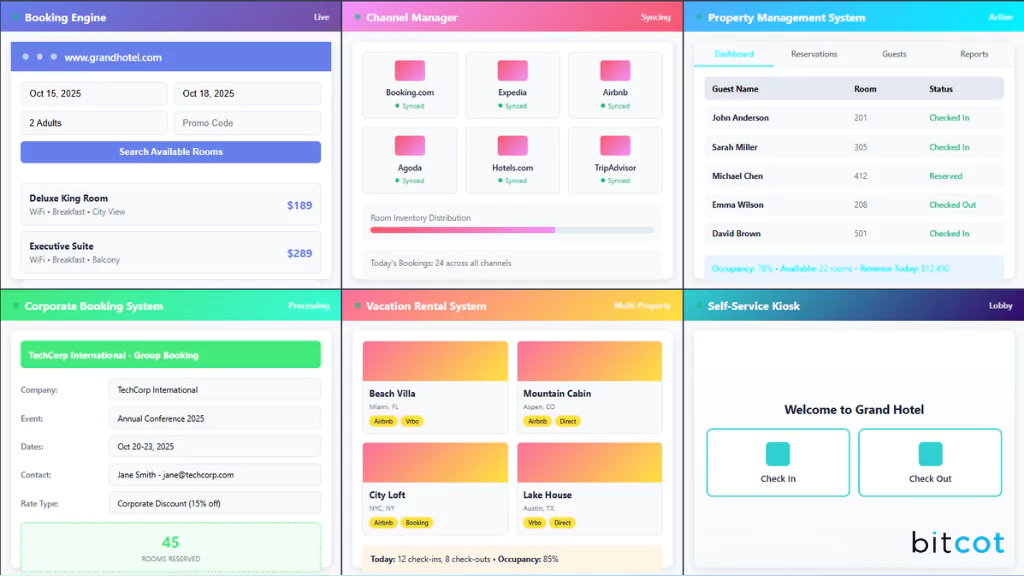
Not all hotels operate the same way. Some cater to budget travelers, others focus on luxury experiences, and many are designed to handle specific types of clientele like business travelers or vacationers.
As a result, hotel booking systems come in different types, each tailored to suit a particular hotel’s needs.
Here’s a look at the major categories:
1. Hotel Booking Engine Systems
Booking engines are software solutions for hotel booking system requirements, specifically those related to processing secure, real-time reservations from the hotel’s website or app. A booking engine for hotels is designed to streamline the guest’s booking experience and integrate with the hotel’s property management system (PMS) to ensure real-time availability.
- Key Features:
- Direct bookings: Allows guests to reserve rooms without going through third-party OTAs.
- Customizable user interface: A seamless, branded booking experience on the hotel’s website.
- Secure payment gateway: Ensures that guests can make secure payments during the booking process.
- Room availability & pricing synchronization: Shows real-time availability and pricing.
- Best For: Hotels that want to drive direct bookings and reduce reliance on OTAs, as well as those with a strong online presence.
- Example: A high-end resort encourages guests to book directly through its website by offering discounts and perks for direct reservations via the booking engine.
2. Channel Manager Booking Systems
Channel manager systems allow hotels to manage and distribute their room availability, pricing, and reservations across multiple online channels (OTAs, GDS, metasearch engines, etc.) in real-time. It’s an essential tool for hotels that work with multiple distribution channels, ensuring that their inventory is always up to date.
- Key Features:
- Multi-channel distribution: Easily distribute room rates and availability to OTAs like Booking.com, Expedia, and Airbnb.
- Real-time synchronization: Keeps availability, pricing, and bookings consistent across all platforms.
- Rate parity: Ensures your hotel’s rates are consistent across different booking channels.
- Automated updates: Automatically updates prices and availability to all channels.
- Best For: Hotels that list their rooms on multiple booking platforms and need a centralized way to manage them.
- Example: A mid-sized hotel group uses a channel manager to keep their room availability synced with dozens of OTAs and third-party booking websites, reducing the risk of overbooking.
3. Property Management Systems (PMS) with Integrated Booking
A Property Management System (PMS) is the central software that helps hotels manage front-office operations like reservations, check-in/check-out, and housekeeping. Many PMS platforms now come with integrated booking capabilities, enabling hotels to handle both room management and bookings in one unified hotel booking management software.
Implementing a unified hotel reservation and booking system is crucial for ensuring that room availability is synchronized instantly across the hotel’s website, mobile app, and external travel agencies.
- Key Features:
- Guest management: Tracks guest history, preferences, and payment details.
- Integrated booking management: Manage direct bookings alongside front desk and housekeeping operations.
- Check-in/check-out management: Simplifies guest check-in and check-out with digital forms or kiosks.
- Reporting & analytics: Provides data on occupancy rates, revenue, and customer behavior.
- Best For: Mid-sized to large hotels looking for an all-in-one management system that combines reservation and operational capabilities.
- Example: A resort with over 100 rooms uses a PMS to manage guest check-ins, track bookings, and generate reports on occupancy and revenue. The system integrates with online hotel booking software to manage both direct and OTA bookings.
4. Corporate or Group Booking Systems
Corporate or group booking systems are designed to handle bulk or recurring reservations, typically for businesses, conferences, or large groups. These systems are perfect for hotels that cater to business travelers or group events.
- Key Features:
- Bulk booking capabilities: Allows booking of multiple rooms at once for group or corporate events.
- Corporate rates & discounts: Provides special pricing and packages for business clients.
- Corporate account management: Manages individual company accounts, billing, and corporate-specific services.
- Event coordination: Facilitates booking rooms for corporate events, meetings, or conferences.
- Best For: Hotels that frequently handle business events, conferences, or large group bookings (e.g., wedding parties, corporate retreats).
- Example: A convention center hotel allows companies to reserve rooms in bulk for their employees, offering corporate discounts and integrating booking with event management tools.
5. Vacation Rental Booking Systems
While most hotel booking systems focus on traditional hotel accommodations, vacation rental booking systems are specialized for short-term rentals, like apartments, villas, and B&Bs. These systems often include tools for managing multiple properties and offering unique guest experiences.
- Key Features:
- Multiple property management: Ideal for vacation rental operators managing several properties.
- Integrated with rental platforms: Syncs with platforms like Airbnb, Vrbo, and Booking.com.
- Customizable guest communication: Allows hosts to communicate directly with guests, send booking confirmations, and provide check-in details.
- Flexible booking options: Offers nightly, weekly, or monthly rental options.
- Best For: Independent vacation rental operators or boutique properties offering short-term stays.
- Example: A vacation rental owner manages multiple listings on Airbnb, Booking.com, and their own website, using a vacation rental system to keep availability and rates synchronized across all channels.
6. Self-Service Kiosk Booking Systems
Self-service kiosk booking systems allow guests to check-in, book rooms, or even make payments through an automated kiosk, usually located in the hotel lobby. These systems help streamline the check-in process and can save time for both guests and staff.
- Key Features:
- Self check-in/out: Guests can complete the booking process, including check-in, payment, and room assignment.
- Integration with PMS: Syncs with the hotel’s property management system to manage reservations and guest data.
- Touchscreen interface: User-friendly and often multilingual for international guests.
- Payment processing: Accepts payments through credit/debit cards or digital wallets.
- Best For: Hotels with high guest turnover or those looking to offer a quicker, more efficient check-in/check-out process.
- Example: A busy urban hotel uses self-service kiosks in the lobby, allowing guests to skip the front desk entirely and check in on their own.
These types of hotel booking systems cater to different operational needs and target audiences. When investing in robust software for hotel booking system implementation, it’s important to assess factors like the hotel’s size, target market, operational complexity, and technology infrastructure. Each system comes with its own set of features designed to streamline booking operations and enhance the guest experience.
How to Build a Hotel Booking System in 3 Phases
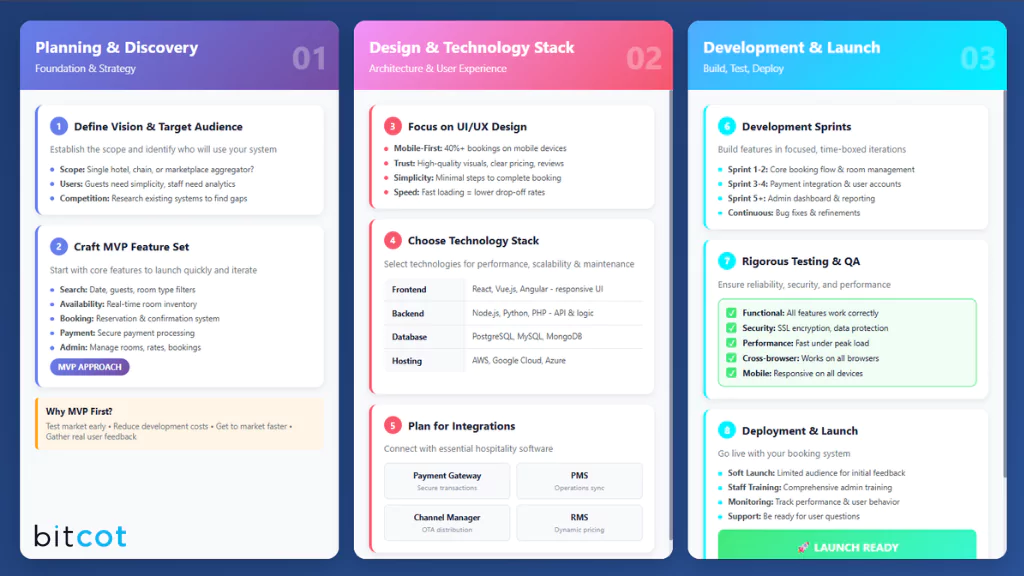
A robust, user-friendly hotel booking system is the digital engine of a modern hospitality business. It not only facilitates reservations but also manages inventory, automates tasks, and drives direct revenue.
Whether you’re a hotelier looking to upgrade your tech or an entrepreneur aiming to create a new online travel platform, this blueprint will guide you through the essential steps.
Phase 1: Planning and Discovery
Before writing a single line of code, a solid plan is paramount. This initial phase sets the foundation for your entire project.
1. Define Your Vision and Target Audience
- Determine Scope: Are you building a system for a single hotel, a chain, or a marketplace (aggregator) like Expedia? This choice significantly impacts complexity.
- Identify Your User: Who will be using the system? Guests, hotel staff (front desk, managers), or both? Your system must cater to the specific needs of each user group. For example, guests need a simple, quick booking path, while managers need powerful analytics and reporting.
- Competitor Analysis: Research existing booking systems. Identify what they do well and, more importantly, where they fall short. This helps you define your unique value proposition.
2. Craft a Feature Set (MVP)
When you’re building hotel reservation booking software, it’s essential to begin with a Minimum Viable Product (MVP). This is the simplest version of the system that includes just the core features necessary for it to function.
The purpose of an MVP is to get your system up and running quickly, allowing you to focus on the essential functionality that meets your guests’ needs while minimizing development time and cost.
Once you have this baseline, you can continue to add more advanced features and refinements over time.
Starting with an MVP allows you to:
- Test the market: By launching an MVP, you can test how well the system works with real users and gather feedback early on.
- Save on development costs: By focusing on only the most important features, you reduce initial development costs and avoid spending time on unnecessary elements.
- Increase speed to market: You can start taking bookings and growing your customer base sooner, rather than waiting for a fully-featured product.
Phase 2: Design and Technology Stack
The design defines the user experience, while the technology stack dictates performance, scalability, and maintenance.
3. Focus on UI/UX Design
- Mobile-First Approach: Over 40% of bookings are made on mobile devices, making mobile responsiveness non-negotiable. The experience on a smartphone must be seamless.
- Clarity and Trust: Use high-quality visuals and clear, transparent pricing. Include a space for guest reviews and ratings to build trust.
- Simple Booking Flow: Reduce the number of steps required to complete a booking. Too many clicks lead to high drop-off rates.
4. Choose Your Technology Stack
You have two main paths: using a website builder with a booking plugin (quicker, less custom) or custom hotel booking app development (more control, more time/cost).
| Component | Technology Considerations (For Custom Development) |
| Frontend (User Interface) | React, Vue.js, or Angular for a dynamic, fast user experience. Ensure it’s responsive. |
| Backend (Server Logic & Database) | Python (Django/Flask), Node.js (Express), or PHP (Laravel) for core application logic and API creation. |
| Database (Data Storage) | PostgreSQL or MySQL for relational data (bookings, users). MongoDB for non-relational data (reviews, property details). |
| Cloud Hosting | AWS, Google Cloud, or Azure for reliable, scalable hosting. |
5. Plan for Integrations
A standalone booking system isn’t enough; it must communicate with other essential hospitality software:
- Payment Gateways: Integration with payment service providers (PSPs) for secure transactions.
- Property Management System (PMS): The core operational software for check-in/out, housekeeping, and billing.
- Channel Manager: Crucial for synchronizing inventory and rates across your direct website and Online Travel Agencies (OTAs) like Booking.com or Expedia to prevent double bookings.
- Revenue Management System (RMS): For dynamic pricing based on demand, season, and competition.
Phase 3: Development, Testing, and Launch
The building phase transforms the plan into a functional product.
6. Development Sprints
Hotel booking software development is typically broken into sprints (short, focused periods) where the team builds and tests a specific set of features. Prioritize the MVP features first.
7. Rigorous Testing and Quality Assurance (QA)
Testing is not optional. It ensures the system is reliable, especially under peak load.
- Functional Testing: Check that all features work as intended (e.g., search returns correct results, payment processes successfully).
- Security Testing: Verify that sensitive guest data and payment information are fully protected using SSL encryption and industry best practices.
- Performance Testing: Ensure the system remains fast and responsive even when a large number of users are searching or booking simultaneously.
8. Deployment and Launch
Once testing is complete and all bugs are fixed, the system is deployed to a live server.
- Soft Launch: Consider a soft launch with a limited audience to gather real-world feedback before a full public release.
- Training: Provide comprehensive training for your hotel staff on how to use the administration side of the new system.
Cost Factors in Hotel Booking Software Development
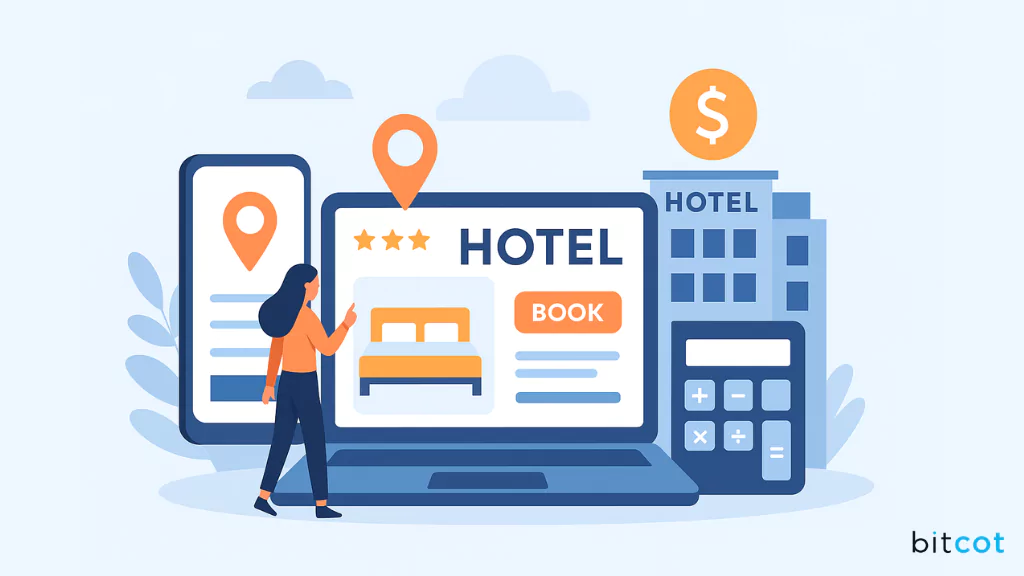
The investment required to build online hotel reservation booking software is highly variable and depends entirely on your chosen approach and the complexity of your features. Just as building a shed costs less than building a skyscraper, the scale of your booking system dictates the budget.
Here is a detailed breakdown of the primary factors that influence the total development cost.
1. Development Approach: Build vs. Buy
Your first decision is the most critical cost driver in hotel booking management software development.
| Approach | Initial Investment | Customization & Control | Time to Market | Target Business |
| 1. Off-the-Shelf/SaaS | Low ($100 – $500/month + Setup Fees) | Limited (Template-based) | Fastest (Days to Weeks) | Single hotel, B&B, small chain |
| 2. Custom Development (MVP) | High ($40,000 – $90,000+) | Full control, Scalable | Slow (4 to 9+ Months) | Multi-property chain, OTA/Aggregator |
| 3. Hybrid/Customized Plugin | Moderate ($5,000 – $20,000) | Moderate (Using a platform like WordPress) | Medium (Weeks to Months) | Boutique hotel, small-to-mid-size hotel |
2. Feature Complexity and Scope
The more time developers spend on custom logic, the higher the cost.
- Basic Features (Lower Cost): Simple search (check-in/out dates, number of guests), basic room descriptions and photos, single-step payment, automated email confirmation, and simple back-end reservation tracking.
- Advanced Features (Higher Cost):
- Dynamic Pricing Engine: Algorithms that adjust rates in real-time based on demand, seasonality, and competitor data.
- AI/ML Personalization: Recommending rooms or packages based on a user’s search history and preferences.
- Multi-Language/Multi-Currency Support: Translating all content and offering real-time currency conversion.
- Loyalty & Rewards Program Integration: Custom modules for points tracking and redemption.
- Virtual/3D Tours: Integrating complex media formats into property listings.
3. Third-Party API Integrations
A modern booking system cannot function in isolation. Every integration with an external service adds complexity and cost.
| Integration | Cost Driver | Rationale |
| Channel Manager/GDS | High | Requires complex, secure, two-way communication to synchronize inventory across dozens of OTAs (Booking.com, Expedia) in real-time. |
| Payment Gateways | Medium | Integrating with processors like Stripe or PayPal requires security compliance (PCI DSS) and handling various payment methods. |
| PMS (Property Management System) | High | Linking your booking engine directly to the hotel’s core operational system (e.g., Opera, Cloudbeds) for seamless check-in/out and billing. |
| Mapping Services | Low | Integrating Google Maps or a similar service for property locations and directions. |
4. Design and User Experience (UI/UX)
- Template Design (Lower Cost): Using pre-built, standardized design elements and booking forms.
- Custom UI/UX (Higher Cost): Hiring designers to create a bespoke, brand-aligned interface with custom animations, complex interactive elements, and unique booking funnels. A complex design increases the development time required to code it accurately.
5. Development Team Structure
The most significant part of your budget will likely be allocated to the hotel booking platform development team. Depending on the complexity of your system and your development timeline, the costs can vary widely.
Here’s a breakdown of the roles you’ll need:
- Project Manager: Oversees the entire project, coordinates between departments, ensures deadlines are met, and handles communication.
- Frontend Developers: Responsible for designing and developing the user interface (UI), ensuring a responsive and smooth user experience.
- Backend Developers: Handle server-side logic, databases, integrations, and API development for functionality like payment processing and room availability tracking.
- UI/UX Designer: Focuses on creating an intuitive and visually appealing interface to improve usability.
- Quality Assurance (QA) Testers: Ensure the system is free of bugs and performs well under different conditions.
- Security Experts: It’s essential to invest in security professionals, especially for handling sensitive user data and complying with privacy regulations (e.g., GDPR, PCI DSS).
6. Post-Launch and Hidden Costs
Don’t forget the long-term expenses, which can account for 15-20% of the initial development cost annually:
- Hosting and Infrastructure: Costs for cloud servers (AWS, Azure) that scale to handle high traffic during peak season.
- Maintenance and Updates: Ongoing costs for bug fixes, security patches, framework updates, and new feature development.
- Security and Compliance: Regular security audits and ensuring compliance with regional data protection laws (e.g., GDPR, CCPA).
- Licensing Fees: Annual fees for any third-party software, such as PMS or Channel Manager subscriptions.
While the initial investment can seem high, remember that a robust and efficient booking system can drive significant ROI by improving customer satisfaction, increasing direct bookings, and streamlining hotel operations.
Partner with Bitcot to Build Your Custom Hotel Booking System
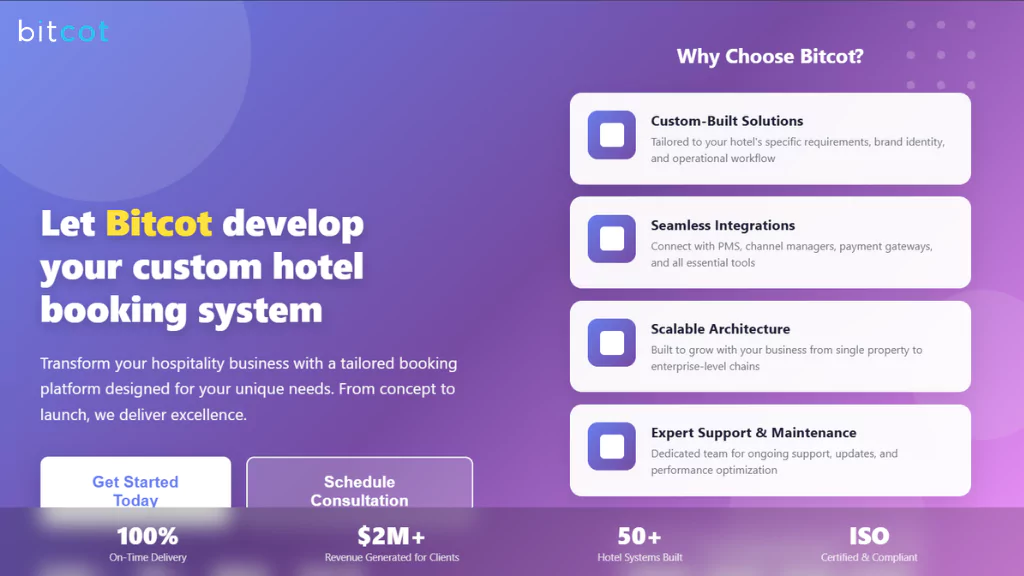
Building a custom hotel booking system is an important investment that requires expertise, time, and resources. Partnering with an experienced development team like Bitcot ensures you get a tailored solution that meets your unique needs and scales with your business.
Here’s why Bitcot is the right online booking system development company for your hotel booking system:
- Expertise in Custom Development: At Bitcot, we specialize in building custom hotel booking systems with deep experience in the hospitality industry. Our team understands the specific challenges hotels face and designs solutions that enhance both guest experience and internal operations.
- Tailored Solutions for Your Hotel’s Needs: Whether you run a small boutique hotel or manage multiple locations, Bitcot customizes your system to suit your business. Features like multi-property management, real-time booking synchronization, and third-party tool integrations ensure your solution fits perfectly with your operations.
- Cutting-Edge Technology: Bitcot uses the latest technologies to build secure, fast, and efficient systems. From mobile optimization to cloud infrastructure, you get a modern, high-performance system that delivers an exceptional user experience across all devices.
- User-Centric Design: With a focus on UI/UX, Bitcot ensures your booking system is intuitive and easy to use. A well-designed system leads to higher conversion rates and better customer satisfaction, providing a smooth and engaging experience for both your guests and staff.
- Ongoing Support & Maintenance: Bitcot provides continuous post-launch support and maintenance, ensuring your system stays updated with new features, security patches, and bug fixes. As your hotel grows, Bitcot can also scale your system to meet increasing demands.
- Faster Time to Market: Bitcot follows an agile development approach that helps accelerate the process of building your hotel booking system. You’ll be able to launch your MVP quickly, get early feedback, and iterate on features to meet real-world demands.
- Cost-Effective & Transparent Pricing: Bitcot offers transparent pricing and works with you to prioritize the essential features for your MVP. By focusing on the core needs first, we ensure you stay within your budget while delivering a robust system that’s ready for growth.
- Proven Success with Clients: Bitcot has a strong track record of successful hotel booking systems, helping clients increase bookings, improve guest experiences, and streamline operations. Our portfolio of satisfied clients speaks to our ability to deliver high-quality, scalable solutions.
Partnering with Bitcot means you’re not just getting a development team; you’re gaining a trusted partner committed to building a custom hotel booking system that drives efficiency, increases guest satisfaction, and helps your hotel thrive.
Final Thoughts
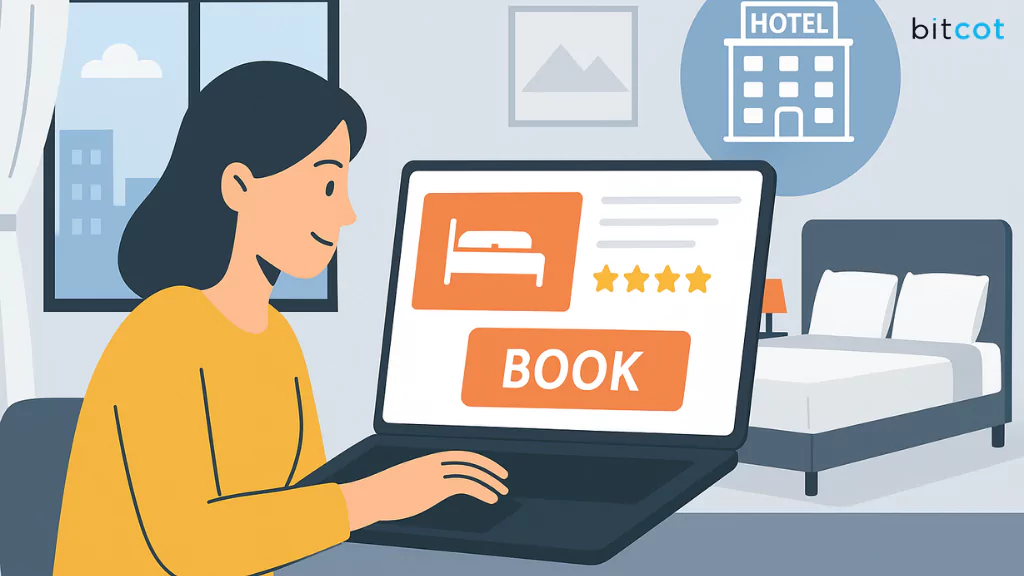
Building a custom hotel booking system is a strategic decision that can elevate your hotel’s operations, enhance the guest experience, and improve your bottom line.
Whether you’re starting from scratch or upgrading an existing system, having the right tools in place will help you streamline bookings, reduce overbookings, and provide your guests with an effortless, personalized experience.
As we’ve discussed, developing such a system involves careful planning, from selecting the right features to choosing the right development partner. By focusing on essential functionalities, integrating with key third-party tools, and ensuring a smooth user experience, you’ll be well on your way to creating the best online hotel booking software that adds value to both your business and your guests.
If you’re looking to take the next step and create software hotel booking system tailored to your hotel’s specific needs, partnering with Bitcot can help bring your vision to life. With our expertise in appointment scheduling & booking system development services, we can create a scalable, secure, and user-friendly solution that grows with your business.
Remember, a modern software solutions for hotel booking system is more than just a tool; it’s an investment in your hotel’s future. Take the time to plan, choose the right features, and work with a partner who understands your business needs. The results will speak for themselves.
Get in touch with our team today.




